#les mis censorship
Text
les mis spanish censorship adventures 5: the bishop deradicalization
LM 1. 1. 10 - The Bishop in the Presence of an Unknown Light
This is so far the chapter I've found the most censoring and edits to and it changes the message a lot. This bishop does not go through any kind of development or reflection (though sometimes the text will say he is 'shaken' and other lines like those are leftover, which make little to no sense with all the cuts). This is just another 'the bishop is kind' episode and it feels really pointless and strange.
I did not translate all of this because it's a lot of text and it's pretty similar to the english translation anyway. I merely translated the stuff that was changed and left the rest as in the hapwood text. You can see on the screenshots HOW MUCH it was cut (all the boxed sentences) and the edits in red.
Below the cut I'll elaborate on the changes, I recommend you look at the pics first and then go back here if you want to be surprised about them.
.
.
Pro revolution sentiments are cut, the conventionalist mentioning having voted for it is cut, which seems kind of unnecessary considering they mention 93...
The 'to what name to you object line' is SO good, he has just compared a king's grandson and a "criminal"'s brother (Cartouche was a thief from the little I read about him so eh) as people who paid for their families crimes undeservingly and when the bishop is like I don't like these names together G is like which of the two, which implies the king is a lot worse which he is and I just really enjoy that line! But in the censored version after the bishop objects he's just like alright and says nothing because they CUT IT because they KNOW it's a great answer :/
Another really good significant part is destroyed when instead of the 'equally?' part we get "I cry with you" from the bishop and no answer from G again. The suffering of the monarchy and poor people is the same. :///
The way it's cut makes it seem like the bishop is on the right, bc he'll say something and then G will go quiet and then seemingly change the subject when there's actually reactions and more conversation happening . It makes it seem like G is in a bit of a rant too.
A bunch of text about how much money the bishops have and how they have a lot of food is cut, I guess because G is talking about the church in a negative way. The Jesus Christ line is obviously cut.
Lines like the bishop feeling shaken and 'now it was time for the bishop to be humble and G to be arrogant' are kept, which is confusing. There's another one about the bishop being moved later on, and it's like why?? There's nothing on this text that warrants this reaction from you?
I looked up the names G mentioned and I really like how he repeatedly compares revolutionaries with crimes that are done in the name of Catholicism as the 'if this is bad how can this other guy be good'. There's the Dragonnades (which was a government policy of repression ordered by the King in which protestant families were intimidated by the military, by abuses and destroying their property etc, into converting to Catholicism) which Baville and Francois and Letellier son (aka Marquis de Louvois, who was a war minister )have part on. There's Saulx-Tavannes being a catholic military leader during the French Wars of Religion... it's very good to go with that specific route when talking to a bishop I think. And there's Letellier senior (father), to which what I said doesn't apply, but he repressed uprisings from the people (la fronde) so it's another good one.
Anyway, they cut from all those except Marquis de Louvois. I really did not do any more research than going on wikipedia so I don't know why they decided that was a good one to stay. And with those cuts also disappears the paragraph where it's explicitly said the bishop is offended but not on the side of logic.
The final cut of their conversation is that they change it so that the bishop is the one who blesses the conventionalist, as it should be.
The bishop redoubles his tenderness, we don't really know why, nothing has really changed in him. (I know he doesn't change per se because of G in the original, but I do think he is changed by the event)
Then they cut the part where the bishop says G is in heaven and because this bishop has not been #radicalized, the whole section of the red cap is cut.
AND because they cut this, they leave this:
""Was the bedside of such a dying man as that the proper place for a bishop? There was evidently no conversion to be expected. All those revolutionists are backsliders. Then why go there? What was there to be seen there? He must have been very curious indeed to see a soul carried off by the devil."
AS THE CONCLUSION of the chapter??? which is so wild. G is in hell, reader, and the narrator is confused about why Myriel even went to visit him. What a nice way to end it on.
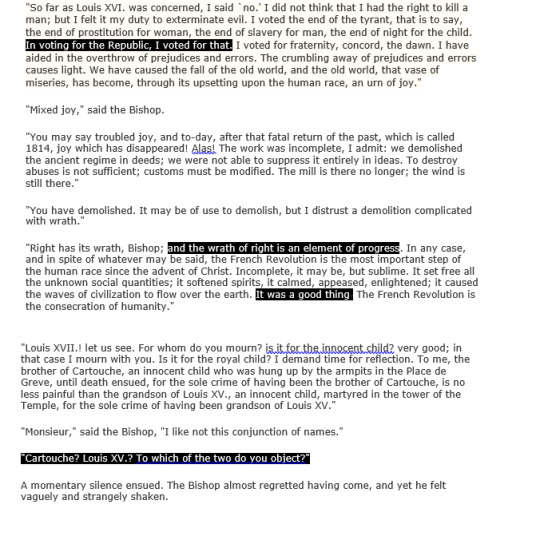



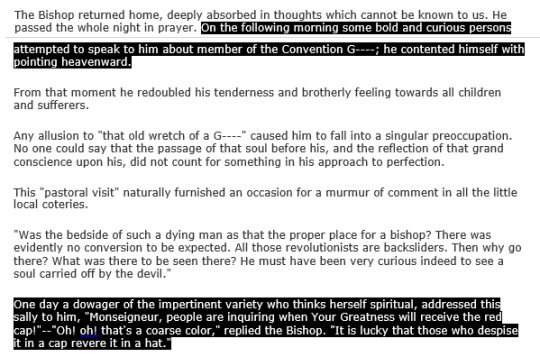
#les mis censorship#les mis letters#les mis#Ignore my typos thx#nooo don't say the french revolution was good you're so sexy aha (cut cut cut)#nooo don't say anything bad about catholicism#etc etc
31 notes
·
View notes
Text


old old stuff that never made it to main. more to come
#sorry for the censorship u know how it is#real besties have seen valjean full frontal#em posts#valvert#javert#jean valjean#les mis#les miserables#valvert week
198 notes
·
View notes
Text
In 1815, M. Charles-François-Bienvenu Myriel was Bishop of

#this is my way of announcing that i'm doing a full les mis letters catch up from square one#(it's the only way my autistic brain will let me catch up on days i missed bc it still has to all be in order ofc)#so don't mind me over here making memes like three months too late 🤪🫶🏻#les mis#les mis letters#lm letters#lm 1.1.1#bishop myriel#the censorship is so funny to me so here#mine
115 notes
·
View notes
Text
The Continuing Saga of Les Misérables and Censorship
"Continuing" in that I continue to find out more about this one specific instance that took place in Philadelphia in the late 1890's.
To recap, Miss Dalcourt, a French teacher at an all girl's high school, proposed an abridged version of Les Misérables as part of her curriculum. However, the majority of the school board voted that it should be banned, as the topic of "grisettes" was inappropriate. The story was picked up (and mocked) around the country, including in the Vestkusten and the Abendblatt (newspapers for Swedish and German immigrants, respectively.) [See here for the full saga.]
@sherbertilluminated had previously translated an article for me from the Abendblatt, which told how Les Misérables was ultimately allowed in Miss Dalcourt's classroom and asked me to keep an eye out for any other German language articles on the subject. And so today Sheb and I (but mostly Sherb) bring you this opinionated piece from the Abendblatt, published the 13th of October 1897:
The decision of a committee of the Philadelphia School Board not to recommend Victor Hugo’s moral novel “The Poor and the Miserable” [Les Miserables] as a French text for the public high school for girls has aroused scrutiny and consistently suffered derogatory judgment. Superintendent Rover’s proposal to use the book in a girl’s school for instruction in the French language may appear conspicuous and could rather have deserved censure. One can find the goal of the author to introduce the reader into the lives of the lowest classes meritorious, and nevertheless need not consider the filth uncovered there to be a suitable intellectual nourishment for immature daughters. One does not lead the youth into those classes in real life, why should one then do so in school? The task of the school is to enrich the youth with knowledge, not with things whose acquaintance has a very dubious worth also for [those of] mature age.
Novels will be written in order to create the largest possible draft; there the moral aim is least determinative and will be most highly followed, incidentally. And then the moral aim is not to make the uncorrupted youth acquainted with the blights of human society, but to make attentive toward suppressing these blights those who can work toward such. A teenage girl [“baked fish,” apparently a slang term?], seated at school, cannot do this. Certainly Hugo did not write the novel for school.
That Victor Hugo’s books are found in our public library has long proven nothing. In our public library are found quite many books which were not designed for youth, as in our Art Institute are found quite many statues before which a chaste maiden need not linger in critical observation. One does not suit himself for all, neither in the visual arts nor in the scriptural. There are parents who would never ever, if they knew it, foist such reading material onto their children, but there are also parents who would, and those who would never ever, if they knew that Victor’s work “Les Miserables” also visited the [children] of the High School, would put it in their hands. We must thus defer to the committee. In any case, the judgment of a whole delegation, according to the trials put before them, is greater than the judgment of an individual who only admires the language in the work. The pupils of the Philadelphia High School are in any case not so advanced that they cannot know to differentiate between a work of Hugo’s and [that] of another of the better French writers. On this point we can be assured. Full respect to Hugo’s spirit and his creations, but also full respect to the discrimination of the Philadelphian committee, who, itself in danger of exposing itself to the accusation of prudery, has the courage to refuse the youth a dish which they still are incapable of digesting.
The bold parts are just me highlighting the parts I found most entertaining. Also, the whole second paragraph, where the author says that the goal of Les Mis is to effect change and that high school girls can't effect change....wow rude. I do love to read an opinionated article though, even if the opinion is not one I agree with.
Anyways, thanks again to Sherb for sharing this with me! There are so many different archives online with materials in different languages, I would encourage anyone who is interested to check them out. When you find something really cool, an old article that probably hasn't been read in decades, it's an awesome feeling.
42 notes
·
View notes
Text
other les mis accounts: many people don’t realize how tragic the story of les miserables is, and how lots of hugo’s life experience can be found in the text. for example, the relationship between cosette and valjean, the fear of losing her to marriage… and let’s not forget all the politics of the time and how hugo brilliantly avoided censorship! complicated explanation here, okay, and the way he portrays the relationship between enjoy and grain has an underlying tone tied into politics of the time [sites a bunch of text]
me: they fuck nasty and that one right there is obviously an autistic. which one? sorry, my bad, all of them. oh, proof? uhhh i asked hugo himself. he's dead? oh. good, i guess. anyways
#seanposting#les mis#les miserables#grantaire#enjolras#combeferre#marius pontmercy#les amis de l'abc#courfeyrac#joly#bossuet#montparnasse#cosette fauchelevent#jean valjean#victor hugo#javert
148 notes
·
View notes
Text
Ahh, the Hapgood translation leaves out what seems like a significant line from Les Mis, where Jean Valjean expresses doubt in God? In the Hapgood version of lm 1.2.3 Jean Valjean says:
I thought it was going to rain, and I re-entered the town, to seek the recess of a doorway
But the Wilbour translation says:
I thought it would rain, and there was no good God to stop the drops, so I came back to the town to get the shelter of some doorway.
Why would Hapgood cut this line? Was she deliberately leaving out a moment where the novel’s protagonist expresses doubt in God, for 19th century censorship reasons? I need to learn French so I can actually reread the novel without worrying about the translators choosing to arbitrarily rewrite or cut lines they don’t agree with 😂
But yeah, I’m now tempted to dive into another translation because I didn’t know Hapgood took such *huge* liberties XD (I thought her whole thing was being “very accurate except for numbers, but very clunky.”) Now I’m wondering what else she arbitrarily cut and altered, that I didn’t notice because I don’t know French
62 notes
·
View notes
Text


El Cuarteto de Nós are a Uruguayan Rock band made in 1980 and still running.
They first started by making most of their albums of being satires of society and dark humor, all through "Alberto wolf" to 2004 "El cuarteto de nos" and went into inactivity, until coming back in 2006 "Raro" and onward to be more experimental and weird.
They've been nominated once in the grammy latino, their most famous songs are "Ya no sé qué hacer conmigo", "Lo malo de ser bueno" and "El Hijo de Hernández". Propaganda below;
"Buenisima música, ya llevan su tiempo en la industria, reconocidos en latam y a mis amigos les gusta"
"Literalmente cultura uruguaya y argentina, es la unión de nuestra guerra eterna- Tan buenas canciones que Miku le hizo un cover a enamorado tuyo y es lo mejor que me pasó en la vida- De las pocas bandas que no cantan solo de amor y desamores, fanáticos de la psicología where are you literalmente hicieron un album basado en Rorschach (perdon soy aromantico, me aburren las canciones de amor) - Nos hicieron una canción a los argentinos pq los alemanes nos hacían burla en el mundial, literalmente latam solidarity"
"Sus canciones son bien buenas osea escuchenlas y les juro que aunque no sean muy fans del rock les van a encantar"
"🇺🇾🇺🇾🇺🇾🇺🇾🇺🇾"
-----------------------
Los Prisioneros was a Chilean Rock band first made in 1979 and became the most influential and impactful 80s band of that decade.
In the beginning, they developed a new wave sound with punk nuances to later approach synth pop in their garage. they became known for their songs full of content and social criticism, which served as inspiration to awaken a generation that was being oppressed by the military dictatorship, who used these songs as a fight against the regime of Augusto Pinochet.
This caused censorship of the band in the main media, until the early 1990s. Despite the veto, they had great unprecedented commercial success, which crossed borders in countries such as Colombia, Ecuador and Peru. Coinciding with the transition to democracy, the first breakup and restructuring of the band occurred: early 1992, when the band broke up.
Their most famous songs are "We Are Sudamerican Rockers" (Despite being banned in its home country), "Tren Al Sur" and "Estreches del Corazón".
41 notes
·
View notes
Text
i just bought an abridged version of les mis and it doenst have grantaire in it???? censorship! this will not stand!
29 notes
·
View notes
Text
Tornem, Volvemos, Go Back
Després de tot el mes d'Octubre i quasi tot el mes de Novembre amb el compte cancel·lat i depres de dues apel·lacions per part meva.
Per fi el Blog ha estat restaurat, tornem a la càrrega amb més fotos i vídeos, això si també amb més auto-censura perquè no ens torni a passar la cancel·lació.
Totes sabeu que mai no s'ha publicat en aquest Tumblr cap imatge de nu integral, ni d'actes sexuals i seguirem sense fer-ho, però les nostres més de 24.000 seguidores sabran valorar les decisions que ara hagi de fer.
================================================
Después de todo el mes de Octubre y casi todo el mes de Noviembre con la cuenta cancelada y después de dos apelaciones por mi parte.
Por fin el Blog ha sido restaurado, volvemos a la carga con mas fotos y videos, eso si también con mas auto-censura para que no nos vuelva a ocurrir la cancelación.
Sabéis que nunca se ha publicado en este Tumblr ninguna imagen de desnudo integral, ni de actos sexuales y seguiremos sin hacerlo, pero nuestras mas de mas de 24.000 seguidor@s sabrán valorar las decisiones que ahora tenga que hacer.
================================================
After the entire month of October and almost the entire month of November with the account cancelled and after two appeals on my part.
Finally the Blog has been restored, we return to the load with more photos and videos, that if also with more self-censorship so that the cancellation does not happen again.
You all know that no full nude image or sexual acts have ever been published on this Tumblr and we will continue without doing so, but our more than 24,000 followers will know how to value the decisions they now have to make.

54 notes
·
View notes
Note
10, 14, 19 for the violence ask thing? <3
Since ur anon idk which fandom I should gun for...so I'll just ramble incoherently
10. worst part of fanon
I've already answered this, with specifics to the les mis fandom so I shall now apply this to fanon in general:
I'm not sure if this is just me being aroace or what but the fixation on needing to constantly ship characters all the time, even if the piece of media itself is void of romance and is all the better for it.
Once again, I'm not saying that you should never engage a media with romance: fandom is a self-indulgent space and projection is the norm. But it is tiring to only see romance and/or smut about a character when you simply want to see meta or non-romantic art/stories/discussions about them. It's similar to that booktok trend of only advertising their stories using tropes (grumpy x sunshine, mlm etc.); if shipping and romance is the only thing that keeps you in your seat WRT a character or even the piece of media as a whole, then it's a pretty sad takeaway from it.
Typed this whole thing out and now idek if I actually answered the question correctly. Sorry anon, this is what I've got 😔.
14. that one thing you see in fics all the time
Going Les Mis specific: Combeferre wearing glasses 🤭 Yes yes it's a pretty nerdy stereotype but I can't argue with it bc I'm a nerd and I wear glasses. Also people get 150x hotter wearing glasses and Combeferre is already pretty hot so.......
Also smth Combeferre-adjacent, there's never a universe where Enjolras and Combeferre are not soulmates, platonic or otherwise. I WANT WHAT THEY HAVE!! they clearly love each other in canon, in fanon, in AUs...god they're insane.
19. you're mad/ashamed/horrified you actually kind of like…
Under 18s look away I guess? Nothing explicit tho: I got into more NSFW fics recently, with tags I never thought I'd click onto. They're extremely well-written and 8 times out of 10, they tend to use smut and kink to delve deeper (hah) into character exploration as well. That's what I like about fanfic/non-profit writing: topics that would often be taboo in mainstream publishing can be safely explored on page and there's no need for censorship or anything palatable! What you see in the tags is what you gonna get; you've been warned after all! Which is why I dislike the recent trend of demanding censorship on Ao3....
I guess I'm 'ashamed/horrified' about this because I am still rather sex-repulsed IRL lol. I read everything up until the actual intercourse and then my eyes glaze over and only refocus during the aftercare. It's crazy.
(Also I just realised the contrast between my answers for 10 and 19 haha. Yes I love works of smut; yes I'm frustrated when a fandom is oversaturated in smut; yes, both statements can coexist.)
#ty for the ask anon!!#clearly what im learning from this is that i love to share my opinions#syrup ramble#syrup asks
2 notes
·
View notes
Text
SPANISH
Okey pero, no saben el conflicto interno que tengo con que a Raine Whispers de The Olw house lo traten con pronombres incorrectos (Ella/él), en el doblaje latino y otros, cuando claramente elle usa they/them en el idioma original.
Desde mi punto de vista desmerita la intención de danna y minimiza el impacto que la creadora quiere crear con uno de sus personajes no binaries y la buena representación. Espero y pronto puedan recibir un doblaje adecuado, porque si, hay personas no binarias que pueden no usar they/them (elle) sin embargo este no es el caso, y podría llegar a considerarse censura.
Solo queda decir que mientras no pase eso yo me la pasaré peleando en redes sociales para que tomen en serio sus pronombres, por que se hace injusto que lo invaliden de esa manera, porque si bien no es real, la situación que enfrenta es algo que día a día tienen que lidiar muchas personas y eso es inaceptable.
Eso es todo lo que tenia para decir Nos vemos próximamente ଘ(੭*ˊᵕˋ)੭* PD: Les dejo un video de Raine y Eda porque son muy lindis juntis y que todas las parejas de TOH tienen su momento de baile JAHSHSHDCDNHSJW(me gusta usar neopronombres pido perdón)
~~~~~~~~~~~~~
ENGLISH
Okay but, you don't know the internal conflict I have with Raine Whispers from The Olw house being treated with incorrect pronouns (She/he), in the Latin dubbing and others, when clearly they uses they/them in the original language. From my point of view, it detracts from danna's intention and minimizes the impact that the creator wants to create with one of her non-binary characters and the good representation. I hope and soon they can receive a proper dubbing, because yes, there are non-binary people who may not use they/them (elle) however this is not the case, and it could be considered censorship. It only remains to say that as long as that does not happen, I will spend my time fighting on social networks so that they take their pronouns seriously, because it is unfair that they invalidate it in that way, because although it is not real, the situation they are facing is something that Every day many people have to deal with it and that is unacceptable. That's all I had to say See you soon ଘ(੭*ˊᵕˋ)੭*
PS: I leave you a video of Raine and Eda because they are so cute together and that all TOH couples have their dance moment JAHSSHDCDNHSJW(I like use neopronouns I apologize)
#nonbinary#lgbtqia#lgbtq#the owl house#raine whispers#disney#eda clawthorne#eda x raine#non binary representation
13 notes
·
View notes
Text
Les mis censorship adventures 6
LM 1.1.12
The line criticizing the line gets cut in the old translation.
"He was not tall, he was a bit obese; and to combat it he took long walks on foot; his step was firm and his body was slightly bent, detail from which we don't intend to deduce anything. (CUT) Monsignor Bienvenu had what the people call a "fine head" , but he was so kind that he made them forget it was fine."
18 notes
·
View notes
Text
MEW MEW REWATCH - EPISODIO 3

Okay, 'sta cosa che fa Ichigo ammetto che mi fa sbragare dal ridere e godere allo stesso tempo. Parfait ketchup e maionese ... sembrano i pastrocchi che si facevano da bambini con i condimenti, chissà come le è venuto in mente. Ben amministrati, però.
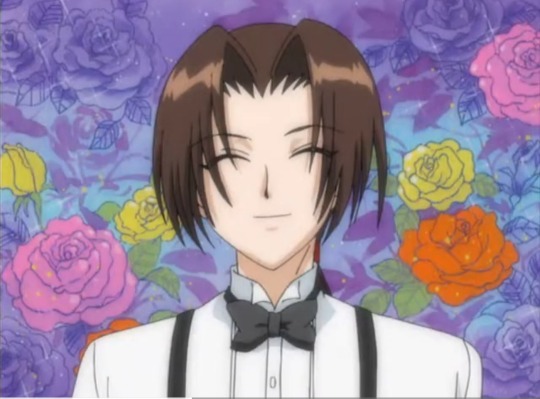
Perfino 'sta faccia di merda la aiuta, tanto facevano schifo le amiche di Retasu.
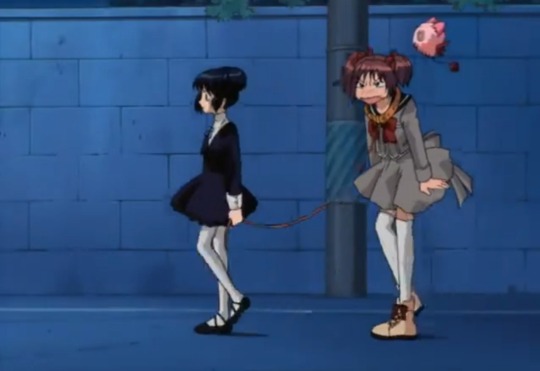
Kinky.
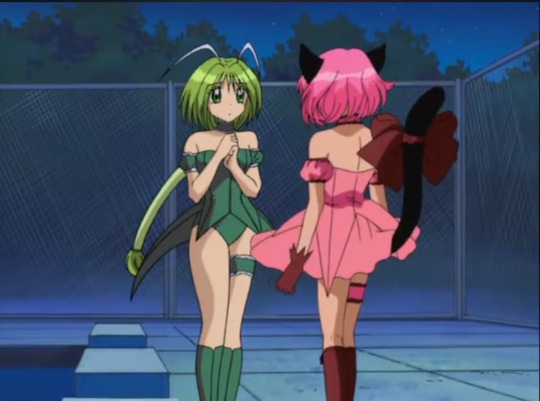
Switching to English here for a more general consideration: in the Italian dub, Ichigo says that she has 'sent away the old Lettuce, that girl submissive to others'. In the English manga translation, I have seen a 'kill the old Lettuce, that shy and timid girl'. I'm not surprised by the censorship on the word 'kill' (considering Mediaset's history with censorship, it's already surprising that they showed all the deaths in the anime finale for what they were. Ask what they did with the dub of 'Magic Knight Rayearth', ask away, ask away), I'm more curious by how 'submissive' (actually not a great thing to be, for your own sake) has replaced 'shy and timid', two adjectives not inherently negative (and in fact, I have seen someonr criticize it here on Tumblr). I'm curious about why the different choice and what translation would come closer to the original Japanese, if someone who could read the original would comment I would be very interested.

Il Disagio si presenta. Mi ricordo ancora l'ansia con cui aspettavo questa scena ai tempi ...
5 notes
·
View notes
Text
The difficulty of disliking Les Misérables when the year is 1862 and all your friends are fans
In this post, I want to explore a particular dimension to the politics involved in reviewing Les Misérables in 1862, through the writings of Horace de Lagardie.
“Horace de Lagardie,” according to the 1884 book Les Pseudonymes du jour, was the pen name of one Madame de Peyronnet. Although there is some confusion over her identity (see here), I am fairly certain that the woman in question is Georgina Frances de Peyronnet (née Whitfield), a British journalist who lived and worked in France. Her father owned a slave plantation in the West Indies and she married a French count of little importance (it is believed that she was the author of the translations published under his name). She wrote a column called the Revue du Mois in Charpentier’s Revue nationale et étrangère. She also published a collection of those articles under the title Causeries parisiennes (Parisienne chit-chat).
Lagardie disliked Les Misérables for a number of stylistic and ideological reasons that I won’t get into here (believe me, it would be a long list) but her articles also offer commentary on the constraints she felt on her ability to voice that dislike. In her first article about Fantine, she writes:
The arrival of the two volumes forming the first part of Victor Hugo’s novel, Les Misérables, has proved a useful diversion. All other subjects of conversation pale before this work, around which a unanimous chorus of praise is raised. Today he who would permit himself to utter the most minor discordant note would be very poorly received and the voice of criticism, even in the most respectful form, is rarely heard. To tell the truth, the passionate admiration that is being produced is a bit astounding to the observer who only sees this book as a literary work. It is difficult to understand how people who didn’t admire Notre Dame de Paris or le Dernier Jour d'un Condamné are so enthusiastic about a work that is similar to them in so many ways, both in its beauty and its faults. This cannot be explained either by admiration for its author or by sympathy for his social theories and it is evident that one must take into account the pedestal of exile from which Victor Hugo has not yet descended.
There’s so much to talk about in just that paragraph! First, there’s her assertation that there was a “unanimous chorus of praise” surrounding Les Mis. Despite the fact that there were negative reviews within three days of the publication of Les Misérables, Hugo’s (successful) advertising strategy (which consisted of asking friendly papers to publish praise alongside excerpts of the book) led to the accusation/impression that there was only praise for the book and that those papers were promoting Les Misérables not in support of the book (as a literary or philosophical work) but in opposition to Napoleon III. (This claim had some merit but the full extent to which it is true is not the subject of this post.) The reference to Hugo’s exile was another common talking point in the same vein.
The reason one might praise Les Mis to express one's dislike of Napoleon III is simply because it was not permitted to criticize Napoleon III in a newspaper. To evade censorship, praising Hugo would signal one’s political sympathies. Lagardie notes how adept journalists had become in this form of evasion:
It is certain that the art of saying without speaking and the use of innuendo have made great progress in France, and it is no longer with clarity that the French mind shines today.
Besides those who wrote disingenuous positive reviews of Les Misérables, there was a sizeable contingent of people who opted to say nothing at all rather than criticize Hugo. But only a few journalists who (ostensibly) shared (some) of Hugo's political views, Lagardie among them, opted to criticize his newest work.
Lagardie observed that:
As soon as the work was published, and following the publishers' preliminary advertisements, we saw first articles by friends who praised universally and en bloc; then came the real critics, then finally the detractors, personal enemies or intolerant adversaries.
But Lagardie positions herself as none of the above, stating: “I think the time has come to state my opinion [on the first volume]. I think it's essentially the opinion of many people who are not as well placed as I am to express it frankly.”
Although I agree with basically nothing she has to say about the contents of the book, it is interesting to note that she was one of the few women positioned to have her opinion published. Maybe her relative anonymity is what gave her the freedom to express her dissent?
(Side note: it’s possible that Hugo read Lagardie’s review of Fantine. Lacroix definitely did and mentions it to Hugo among a list of negative reviews. “So much the better!” he wrote. “A controversy around Les Misérables is excellent. It's the consecration of success and proof of the work's strength.”)
In Lagardie’s review of Cosette and Marius (released simultaneously a month after Fantine), she wonders whether she should continue to publish her negative review since there are so many positive reviews from the journalists in her sphere:
I am beset by doubt over my own competence. Can I be correct, opposed as I am to so many people, especially journalists, and to the author himself; and will I be permitted to judge by the ordinary rules of good taste and good sense a work which, according to general consensus, should be placed above common law? Evidently, I have a different tuning fork than the other critics–at least different than the one they use to tune their writing.
Lagardie asserts that there is a gap between what critics are writing and what they are saying privately (which we know to be true to an extent).
When the public isn't there and the doors are closed, more than a few change their tune, and are more in unison than you might think with "the one who writes these lines," to borrow a favorite expression of the author of Les Misérables.
I've noticed this somewhat contradictory claim in quite a few reviews: that Hugo was buoyed by misguided supporters who made dissenters afraid to voice their opinions, but also that Hugo actually had no supporters at all.
Lagardie notes Hugo’s strategy of courting positive reviews. He wrote letters of thanks to the authors of almost all the positive reviews (and this wasn’t new. There were already jokes about how he did this before the publication of Les Misérables). Specifically, she criticizes how in these letters of thanks Hugo encourages the recipients to support political reform. She cites this letter from Hugo to the publisher of Le Théâtre, Anatole Cerfberr:
With auxiliaries such as yourself, the work I have undertaken will succeed: the recasting of the old world in the mold of the new; the purification of the reality in the crucible of the ideal.
(Note: I assume that Cerfberr, one of Hugo's most enthusiastic supporters, published this letter in Le Théâtre but there is no online archive of that paper, much to my disappointment so I can’t verify this. However, Hugo did use the phrase “with auxiliaries such as yourself” and expressed similar sentiments in several of these letters of thanks.)
Lagardie wonders how Les Misérables could achieve the goal outlined in that letter:
As a plan, that’s not so bad; but as a call to action? Here is what I found by randomly opening the latest volumes:
“This book is a drama whose main character is the Infinite. Man is the second.”
How is it that I didn’t understand all that? Must I accept the explanation I received the other day from a devotee?
“You don't understand it,” he told me, “because you don’t like it.”
In the case of Lagardie, based on her reviews, I think she probably did understand the book, it was just more radical than she would agree with. To this point, we can look at her commentary on the banquet held in Bruxelles in September 1862 to celebrate the success of Les Misérables. About 80 journalists (not all of them French) traveled to Belgium for the occasion.
Without a doubt many people will agree with me that the success of Les Misérable is no reason for Europe to rejoice; but we understand that, in spite of Les Misérables, they wanted to pay homage to a writer who has engaged two generations of enthusiastic readers, and we are saddened by the thought that they had to cross the border in order to do so. [emphasis original]
Ouch. At the banquet, Hugo gave a speech in which he claimed that it was the role of the free press to bring down the old society and remake it. Lagardie argues that there are things worth preserving in society, essentially showing that despite their shared dislike of Napoleon III, she had more conservative aims. But in summary, I think this series of reviews is interesting for the insight it gives us into the different political strategies that informed people's decision to review or not review Les Misérables. In another post, I will explore the review by Edmond Schérer, who had a similar approach to Lagardie.
Thanks for reading!
Sources:
Revue nationale et étrangère
Causeries parisiennes
Lacroix to Hugo, 4 May 1862
My research into the ID for H. de Lagardie
#les miserables#contemporary reactions#posts destined to be tagged long post and read later#my research#my translation
53 notes
·
View notes
Text
I've been watching Les Miserables: Shoujo Cosette. Ie, the World Masterpiece Theatre version of Les Mis. I probably wouldn't have given it a chance if it wasn't for the fact that it is WMT since seeing Cosette as the main character wasn't something I was looking forward to. I should also note before continuing that my attempts to read the book have only got around 20 or so pages in. I might try an audiobook at some point.
Anyway, I'm enjoying this anime version. I'm currently midway through episode 21 and it's interesting. The censoring for kids is well done. Usually I prefer laugh at badly done censorship but there is something of value here. There's certainly a debate to be had on if it is right to censor Les Miserables if it is to be shown, but right now I'm not really interested in that.
I'm more into just collecting some random little thoughts than anything else.
Sister Samplice feels like an anime original and I was surprised to found out that she's from the book. Chou Chou would have been a bigger surprise but no, he's as much of an anime original as he looks like.
Cosette is very much the sort of moe character who I don't like, but there are a few things that I like so far. I like the fact that we see clear cut signs of PTSD from her abuse from the Thénardiers. I have a vague memory of reading once that she doesn't in the book. Considering that even decades after the book was published it was believed that child abuse couldn't lead to PTSD, I find that believable, though i have not been able to find the source that she didn't again. I also like that more focus (in comparison to the musical) is put on her relationship with Jean Valjean. This does allow the annoying parts of her moe characterisation to at least have justification. I should note that according to all sources, they didn't change how moe she was... though I doubt that her riding a dog was in the books. But that was genuinely cute (because she's an anime girl and hence won't break the dog's back) so I count it as the third thing that I liked.
I suppose I'd better address the elephant in the room. I dislike the character designs. I want to like them, especially when I checked out the book illustrations and found them to be quite cartoony too. For the most part individually I have no issues with them. However, when put together, there's too much of a 'beauty equals goodness' feel for me to like them. It's particularly annoying since The Book has a good sense of creating morally complicated characters. Javert has always fit into the idea of a anime villain even though he predates anime by so many years. Seeing him made out to look so obviously like a villain was disappointing.
A few months ago I came across a video on how Avatar The Last Airbender isn't popular in Japan and China due to existing in an uncanny valley but culturally rather than aesthetically. I feel something similar with this series, which is odd because it's often with things that I've been impressed with WMT for portraying well before like Christianity. I don't know how much of this is due to it being an anime and how much is due to it talking about catholicism when I'm used to protestant conversations. There's a lot of little bits though that just feel really off.
You know how I said this is censored and in this case, I'm amused by it though it's done well. I'm going to explain that now. It's things like Fantine not becoming a prostitute so she has instead work really unpleasant jobs, including one with dead fish bones. There's more of a focus on her feeling that she can't trust anyone and we get to watch her homelessness and abuse get to her. Again I'm comparing to the musical and not the book here, but I did enjoy that she got to attack those two men who attack her. (They put snow down her back). Yeah, let the abuse effect her, please. This censorship is well done since it's taking elements that kids haven't had the experience to understand and turns them into ones that kids do. While as an adult, I'm like 'fish bones and selling your body are two very different things' on a level of 'this is a gross thing to feel forced to do for money' it is a stronger idea for kids. Kids aren't supposed to know about sex on the level of understanding how sex work could effect Fantine and most of them wouldn't. At best they might understand that this makes her hard to employ, but she is already a begger on the streets just for having a daughter, so what difference does it make? As an adult who tries to understand children, it could even be argued that this is a stronger way of showing the sexism of the time.
That said, I'm hoping that the kids who grew up with this version went on to either the book or more adult adaptations.
There is another type of change that was made that I actually have a more solid ground on my feelings on. For anyone reading who isn't familiar with WMT they tend to do three things with their adaptions: make them slow, keep as much of the depressing stuff as possible even adding stuff sometimes and make them beautiful. So it wasn't a surprised that this is a slow adaptation. It also wasn't a surprise that there's a lot of focus on the abuse Cosette and Gavroche go through form the Thénardiers. WMT likes to focus on child abuse and not necessarily in a good way. It can often be guilt tripping in the attitude of 'look at what this child goes through and they're not making a fuss'. From what I have seen of this adaptation so far, this attitude is not here. In fact, the show goes out of its way to show that there are good people in the world who will look out for abused children. When Cosette goes off with Jean Valjean, we get to find out that the blacksmith and his wife who took Gavroche on for work is kind so we don't need to worry about him having to stay with the Thénardiers. Another example is discovering that the anime original character Alain is going to be taking over as mayor in the city that Jean Valjean had helped as mayor for so many years. This lighter and softer feel really stresses the hopeful nature of the story without undermining the sadness that it is also very important.
The thing that I like about these more hopeful additions is that they're small. From what I've read spoiler wise, the show still keeps a lot of the character deaths and has already kept Fantine's. As much as I think that doing a kid's version of les mis is interesting and that toning down some aspects is understandable in this instance, I would like to as a les mis fan see as much of the story kept as possible. As a WMT fan though I'm happy that they are showing restraint.
I imagine that I'll have a lot more to say once I finish the series. Especially considering the changes to some of the character deaths I've read about. One of the spoilers I'm already having real concerns about a big one involving an adult character.
5 notes
·
View notes
Note
Hi! From your posts and comments, you know a lot abput the different translations of Les Mis. The one that I have is Wilbour, which I like the most of the ones I’ve encountered, in terms of wording and writing style; are there any issues with it I should be aware of? As people following Les Mis Letters comment on the original French, I’ve noticed a couple things missing, or bits where the translation seems less clear than in some others versions. What are your thoughts on this translation?
Wilbour is a great translation! It's the first English translation of Les Mis, but has many errors because it was published very quickly after the publication of the original novel. The most common criticism I've heard of Wilbour is that it's extremely stodgy and old-fashioned, even compared to Hugo's language; Wilbour often adapts the sentence structure of French very literally in ways that can read awkwardly or not completely correctly in English. But! I've heard he also captures the poetry and feeling of the language better than Hapgood, though, when it comes to 19th century translations.
I believe Wilbour was the first translation I read, and if Hapgood weren't the most easily accessible on the Gutenberg it might be my translation of choice!
He and Hapgood also cut sentences here and there but don't rise to the level of massive deliberate censorship, the way other 19th century translators like Wraxall do.
The only serious error i remember Wilbour making is in Combeferre's speech at the barricade, where he discusses how women are left behind by society. Combeferre says "Women, we are not much given to thinking about them." But Wilbour mistranslates this as "women are not much given to thought" which is the EXACT opposite sentiment to the one Combeferre expresses XD.
If you want a "more accurate" version of Wilbour that fixes the errors he made while translating at an unhealthy pace in a time before the internet existed-- the Fahnestock McAfee translation is meant as an updated version of Wilbour that corrects his errors! However, they occasionally "correct" things he didn't get wrong. For example, there's a moment where Javert boasts "I have claws like a woman" but FMA mistranslates it as "you have claws like a woman." Like, FMA is wrong and Wilbour is right there- Javert is just a strange little guy.
For a translation comparison: here's a comparison of how various Les Mis translators handle Les Amis's introductory chapter, "A Group Which Barely Missed Becoming Historic!" You can contrast Wilbour with other translators here to see the general way he approaches things in comparison to other translators ^_^.
30 notes
·
View notes